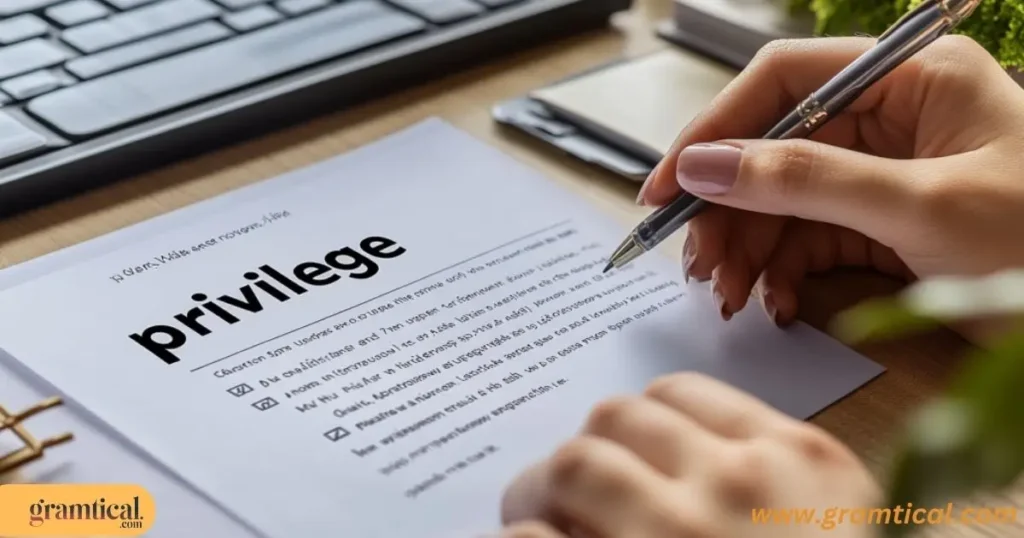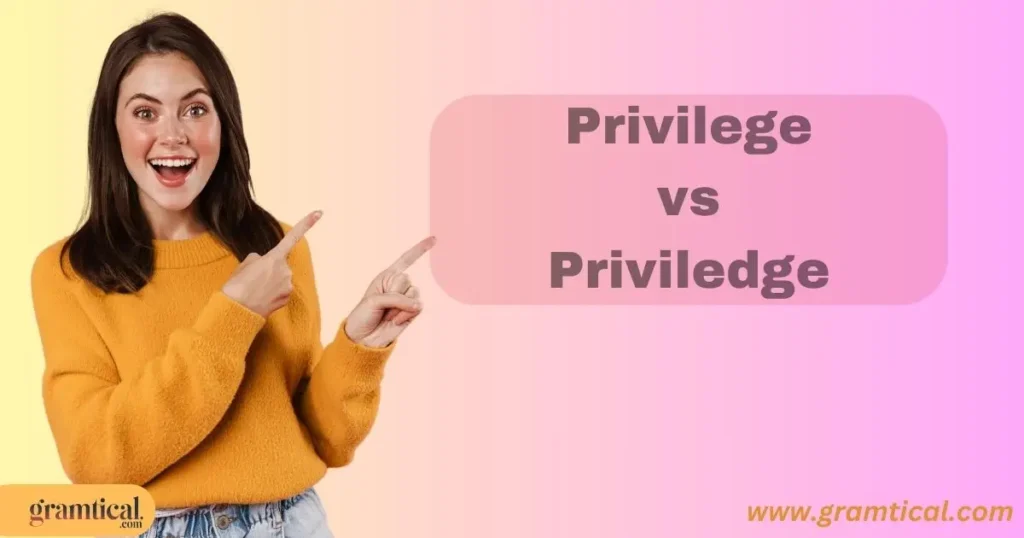- Understanding “Priviledge vs. Privilege”
- How to Use “Priviledge vs. Privilege” Correctly
- Set vs. Sit: Correct Usage in English
- Common Mistakes and How to Avoid Them About “Priviledge vs. Privilege”
- A Comparison: “Priviledge vs. Privilege”
- What’s the Difference Between “Priviledge vs. Privilege”?
- A Quick Comparison Table About “Priviledge vs. Privilege”
- Why Does This Matter?
- Practical Exercises: Priviledge vs. Privilege
- Frequently Asked Questions (FAQs)
- Conclusion
“The spelling dilemma: ‘Privilege’ or ‘Priviledge’? Learn the correct usage and why it matters in communication.”
When it comes to spelling, small mistakes can lead to big misunderstandings. One common error many people make is choosing between “privilege” and “priviledge.”
These two spellings might appear similar, but only one is correct. This blog will clear up the confusion and help you avoid embarrassing mistakes in your writing.
In this post, we’ll dive deep into the difference between “privilege” and “priviledge.” You’ll see examples of how they are used or misused in everyday situations.
We’ll also explore tips to remember the right spelling, along with practical exercises to solidify your understanding.
By the end of this article, you’ll confidently use the correct term in emails, assignments, and conversations. Whether you’re a student, professional, or casual writer, this guide will help you communicate with clarity and precision.
Understanding “Priviledge vs. Privilege”
A Common Confusion
The word “privilege” often trips people up because of its unusual spelling.
It’s derived from the Latin term privilegium, meaning a special law or benefit granted to someone. Over time, the correct spelling remained “privilege,” but many mistakenly add an extra “d,” resulting in “priviledge.”
An Example in Conversation
Imagine this: Sarah is writing an email to her professor. She writes, “It is a priviledge to learn under your guidance.” While the sentiment is clear, the incorrect spelling could leave a less favorable impression.
Rewriting the sentence as “It is a privilege to learn under your guidance” ensures professionalism and correctness.
How to Use “Priviledge vs. Privilege” Correctly

Explanation and Context
The correct spelling is always “privilege.” The incorrect version, “priviledge,” is a common typo or error stemming from the way the word sounds when spoken. To avoid this mistake, focus on the spelling pattern: “priv-i-lege,” not “priv-i-ledge.”
Scenario Example
In a work setting, imagine an employee writing a presentation slide:
- Incorrect: “Leadership is a priviledge, not a right.”
- Correct: “Leadership is a privilege, not a right.”
Email Example
Subject: Request for Leave Approval
Dear Mr. Johnson,
I appreciate the privilege of working in a supportive team environment. Kindly approve my leave for next week.
Thank you,
Alex
By ensuring the word “privilege” is spelled correctly, Alex’s email appears polished and professional.
Set vs. Sit: Correct Usage in English
Common Mistakes and How to Avoid Them About “Priviledge vs. Privilege”
Mistake 1: Adding an Unnecessary “d”
Incorrect: It’s a rare priviledge to receive this honor.
Correct: It’s a rare privilege to receive this honor.
Mistake 2: Pronunciation Confusion
Some people mispronounce “privilege” as “priv-uh-ledge,” leading to the misspelling. Always remember the middle syllable is “i,” not “led.”
Mistake 3: Auto-correct Dependency
Relying on spell-check tools can sometimes reinforce errors. Double-check critical documents manually.
A Comparison: “Priviledge vs. Privilege”
Example 1:
- Incorrect: Attending the ceremony was a priviledge.
- Correct: Attending the ceremony was a privilege.
Example 2:
- Incorrect: She considered it a priviledge to work with the team.
- Correct: She considered it a privilege to work with the team.
Example 3:
- Incorrect: “Privilege” is often written as priviledge in casual notes.
- Correct: “Privilege” is often written as privilege in casual notes.
What’s the Difference Between “Priviledge vs. Privilege”?
- “Priviledge” is an incorrect spelling; it is not recognized in standard English dictionaries.
- “Privilege” is the correct form, meaning a special right, advantage, or honor.
- Example:
- Incorrect: The scholarship was a priviledge.
- Correct: The scholarship was a privilege.
A Quick Comparison Table About “Priviledge vs. Privilege”
|
Word |
Meaning |
Example |
|
Privilege |
A special right or advantage |
It’s a privilege to vote. |
|
Priviledge |
Incorrect spelling of “privilege” |
N/A |
Why Does This Matter?
Spelling mistakes can tarnish your professionalism and credibility. Words like “privilege” often appear in formal contexts, such as job applications, essays, and business emails. Using “priviledge” instead of “privilege” could make your audience question your attention to detail. By mastering this distinction, you demonstrate care and accuracy in communication.
Practical Exercises: Priviledge vs. Privilege
- Rewrite the sentence: “It’s a priviledge to serve my community.”
- Correct: “It’s a privilege to serve my community.”
- Fill in the blank: “Voting is a basic ______ of citizenship.”
- Answer: Privilege
- True or False: “Priviledge” is the British spelling of “privilege.”
- Answer: False
- Choose the correct spelling: “It’s an honor and a ______ to work here.”
- Answer: Privilege
- Correct the mistake: “She had the priviledge of attending the conference.”
- Answer: She had the privilege of attending the conference.
Frequently Asked Questions (FAQs)
Is “priviledge” ever correct?
No, “priviledge” is always a misspelling. The correct word is “privilege.”Why do people spell it as “priviledge”?
The mistake likely stems from pronunciation or a lack of familiarity with the correct spelling.How can I remember the spelling of “privilege”?
Think of the phrase: “It’s a privilege to use correct spelling.”Is “privilege” used differently in British and American English?
No, “privilege” is spelled the same in both variants of English.Does autocorrect always fix “priviledge” to “privilege”?
Not always. It’s best to double-check your writing for accuracy.
Conclusion
Mastering the distinction between “privilege” and “priviledge” is essential for effective communication. Small errors like this can impact how others perceive your professionalism and attention to detail.
By practicing correct usage and learning from common mistakes, you ensure that your writing is always clear and polished.
When in doubt, remember: “privilege” is the correct form. This knowledge is your privilege to apply!

Hi! I’m Ethan Matthews, the admin of gramtical.com. With a deep passion for English grammar, I strive to provide clear, practical resources to help learners master the intricacies of the language.

